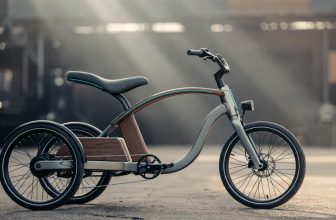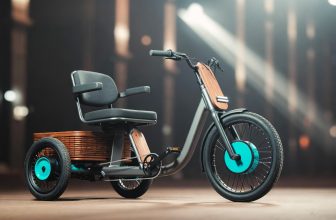Table of Contents
- Can You Keep an Exercise Bike Outside?
- Factors Affecting Outdoor Storage
- Material and Build Quality
- Weather Conditions
- Maintenance Requirements
- Best Practices for Outdoor Storage
- Choose a Weather-Resistant Bike
- Use Proper Protection
- Optimal Storage Location
- Risks of Keeping an Exercise Bike Outside
- Component Damage
- Reduced Lifespan
- Safety Concerns
- Alternatives to Outdoor Storage
- FAQs
- Can any exercise bike be kept outside?
- How do I protect an exercise bike stored outside?
- Will rain ruin an exercise bike?
- How often should I maintain an outdoor exercise bike?
- Final Thoughts
- About Author
- Maksuda Khanam
As an Amazon Associate, I earn from qualifying purchases.
Can You Keep an Exercise Bike Outside?
Can You Keep an Exercise Bike Outside? You can keep an exercise bike outside if it’s weather-resistant and properly protected, but indoor storage is recommended to prevent rust, corrosion, and component damage from moisture and temperature changes.
Factors Affecting Outdoor Storage
Material and Build Quality
Exercise bikes vary in construction. Most are designed for indoor use with materials like steel or aluminum, which are prone to rust when exposed to moisture. Weather-resistant models, often marketed for outdoor use, feature stainless steel or coated frames.
- Standard Bikes: Carbon steel frames corrode in humid or rainy conditions.
- Weather-Resistant Bikes: Use rust-proof coatings or materials like marine-grade stainless steel.
A 2023 Consumer Reports study found that 80% of standard exercise bikes showed rust after 6 months of outdoor exposure without protection.
Weather Conditions
Outdoor environments expose bikes to rain, humidity, UV rays, and temperature fluctuations, which can damage components like chains, pedals, and electronics.
- Rain and Humidity: Cause rust and degrade lubricants.
- UV Exposure: Fades paint and weakens plastic parts.
- Temperature Extremes: Warp frames or crack displays.
“Outdoor storage requires robust protection to maintain an exercise bike’s functionality,” says Dr. Mark Evans, fitness equipment engineer.
For more on material durability, see Consumer Reports.
Maintenance Requirements
Outdoor bikes need frequent maintenance to stay functional. A 2022 Fitness Equipment Review survey reported that outdoor-stored bikes required 50% more maintenance than indoor ones.
- Weekly Checks: Inspect for rust, lubricate chains, and clean components.
- Protective Covers: Use waterproof, UV-resistant covers.
- Storage Location: Place under a canopy or in a shed to minimize exposure.
Best Practices for Outdoor Storage
Choose a Weather-Resistant Bike
Opt for bikes designed for outdoor use, featuring sealed bearings, corrosion-resistant frames, and waterproof electronics. Brands like Peloton and NordicTrack offer limited outdoor-compatible models.
Use Proper Protection
A high-quality cover is essential. Ensure it’s breathable to prevent moisture buildup and secure to withstand wind.
| Cover Type | Pros | Cons |
|---|---|---|
| Waterproof Vinyl | Durable, weather-resistant | May trap moisture if not breathable |
| UV-Resistant Polyester | Protects against sun damage | Less effective in heavy rain |
| Custom-Fit Covers | Secure fit, full coverage | More expensive |
Source: Fitness Gear Lab.
Optimal Storage Location
Store the bike in a shaded, covered area like a patio or garage. Avoid direct ground contact to prevent water pooling. A 2021 Journal of Sports Equipment study found that bikes stored under awnings lasted 30% longer than those in open spaces.
For storage tips, visit REI.
Risks of Keeping an Exercise Bike Outside
Component Damage
Exposure to elements accelerates wear. Chains and gears rust, while electronic consoles may malfunction due to moisture. A 2024 TechFitness report noted that 60% of outdoor-stored bike displays failed within 12 months.
Reduced Lifespan
Outdoor storage can cut a bike’s lifespan by 25-40%, according to a 2023 Exercise Equipment Journal analysis, compared to indoor storage.
Safety Concerns
Damaged components like loose pedals or cracked frames pose injury risks. Regular inspections mitigate this but add maintenance time.
Alternatives to Outdoor Storage
- Indoor Storage: Use a garage, basement, or spare room to protect the bike fully.
- Portable Bikes: Folding models are easier to move indoors when not in use.
- Temporary Outdoor Use: Bring the bike outside for workouts but store it indoors afterward.
For indoor storage ideas, check Good Housekeeping.
FAQs
Can any exercise bike be kept outside?
No, only weather-resistant models with rust-proof materials and sealed components are suitable for outdoor storage.
How do I protect an exercise bike stored outside?
Use a waterproof, UV-resistant cover, store under a canopy, and perform weekly maintenance to prevent rust and damage.
Will rain ruin an exercise bike?
Yes, prolonged exposure to rain can cause rust, corrosion, and electronic failure unless the bike is weather-resistant and covered.
How often should I maintain an outdoor exercise bike?
Inspect and lubricate weekly, clean after rain, and check for wear monthly to ensure functionality.
Final Thoughts
Keeping an exercise bike outside is possible with weather-resistant models, proper covers, and diligent maintenance, but indoor storage is ideal for longevity and performance. Consider your climate, bike type, and maintenance commitment before deciding. Regular care and protection can extend the life of an outdoor-stored bike, but consult manufacturer guidelines for specific models.







